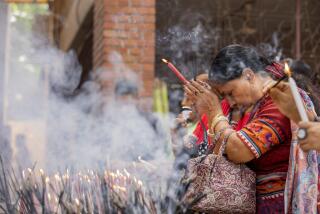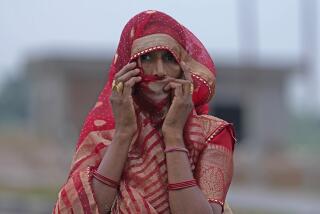India’s Annual Exorcism Fair Caters to Superstition
- Share via
MALAJPUR, India — Farm laborer Jeevan dragged his kicking and screaming wife by her hair toward the priests at the temple of Guru Deoji Maharaj.
Jeevan said she was possessed by evil spirits and needed to be exorcised.
He was among tens of thousands of rural Indians who trekked to the monthlong exorcism fair held every year at the temple in central India, 170 miles south of Bhopal, capital of Madhya Pradesh state.
Jeevan said his wife, Jagoti, had changed after they married.
“She was a good girl and a loving wife. But for the past two years, there has been a sudden drastic change in her behavioral pattern,” he said. “She utters bad language, abuses neighbors, beats up the children, doesn’t wear clothes, and speaks in a man’s voice and a strange language.”
Starting on the Hindu auspicious day of Paush Purnima, a full-moon night in January, the temple’s exorcism fair offers treatment to all who have fallen under the spell of ghosts and evil spirits. On the first day this year, some 70,000 people came to the village.
The majority of those brought for help are women with postnatal problems, but families also bring men, most of whom are suffering from mental disorders.
Psychiatrists say the women may be suffering from treatable mental disorders, but their families believe that the behavior is due to possession by evil spirits.
Doctors also speculate that some women who toil in the house and fields act possessed to garner attention from their families or to get a break from the dreariness of life.
“She starts showing unusual symptoms, behaving strangely. Once she acts as if possessed, everyone gives her attention. The husband who never spoke to her all day will sit next to her and pay attention,” said Sumit Roy, a psychiatrist in Bhopal.
Malajpur is a featureless village whose claim to fame is the temple and its 200 Hindu priests who say they have been trained in the art of expelling evil spirits.
No one knows how the practice of exorcism began, but head priest Chandra Singh Mahant said the fair has been observed annually for about 250 years.
Treatment often includes being beaten by the priests.
Jeevan’s wife rolled on the ground as a priest beat her with a broom. Her hair matted and sari muddied from her contortions, Jagoti shrieked repeatedly until she fainted.
“Bring her back tomorrow if she’s not better,” Mahant advised her husband.
The temple grounds have two banyan trees that Mahant says are home to hundreds of thousands of ghosts and evil spirits that have been expelled from human bodies.
He said spirits sometimes possess human bodies because they want to seek revenge or they fall in love with the person.
“But mostly it’s chance,” he added. “If he bangs into you, he might just decide to enter your body.”
Exorcisms start in the late evening each night of the fair.
Those believed to be possessed are made to circle the temple clockwise. Severe cases must walk backward. As the temple gong sounds, priests chant mantras and the crowd shouts.
People being treated become hysterical. Women savagely toss their hair or roll on the ground. Some run wild. As they shriek and shout, their relatives bring them before the priest, who sprinkles them with sacred water.
Psychiatrists say exorcists can have some success because they are usually people in positions of authority.
“People suffering from hysteria respond to authority,” Roy said. “Exorcists speak in loud, authoritative voices, and the patients respond to their commands.”
“Who are you?” a priest named Bhikharilal shouted at one woman brought by her husband and in-laws. “Why have you entered this woman’s body?”
The woman rolled her eyes, then laughed, cried, howled and whimpered. “I won’t tell you,” she said, swaying from side to side.
“Let’s beat her up,” the priest shouted, raising a broom in his right hand. The woman laughed crazily as the priest alternately struck her with the broom and sprinkled water on her.
The beating continued until the woman rushed toward the gate of the temple, her relatives chasing after.
“Let her go for now,” the priest ordered. “She will come back on her own.”
More to Read
Sign up for Essential California
The most important California stories and recommendations in your inbox every morning.
You may occasionally receive promotional content from the Los Angeles Times.













